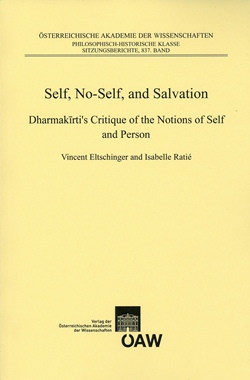
From very early times, the Buddhist intellectuals have made the notion of a self existing over and above the bodily and mental constituents one of their main targets. Their critique first culminates in Vasubandhu’s treatise against the Buddhist personalists (early 5th century CE). The eighth-century philosophers Śāntarakṣita and Kamalaśīla provide another milestone in the history of the mainstream Buddhists’ critique of the self and the person: their Tattvasaṅgraha(pañjikā) contains the most learned and elaborate treatment of the subject (at least before Karṇakagomin’s and Śaṅkaranandana’s Nairātmyasiddhi monographs). But how have Dignāga and Dharmakīrti (6th century [?]) contributed to this heated debate? The present study attempts to answer at least in part this question by offering a monographic account of Dharmakīrti’s position regarding the self. The book’s introduction deals with Dharmakīrti’s view of the self as the paramount expression of nescience. Chapter 1 is devoted to his critique of the two main expressions of Buddhist substantialism, viz. the Buddha-nature teachings and Personalism (pudgalavāda). Chapter 2 presents his way of undermining the non-Buddhists’ arguments in favour of the self. Finally, Chapter 3 provides a detailed account of Dharmakīrti’s most original contribution on the subject, viz. his demonstration that the (belief in the) existence of a self makes salvation impossible.
*** Schon sehr früh haben die buddhistischen Denker die Idee eines Selbstes, das über den körperlichen und emotional-geistigen Konstituenten existiert, zu einem ihrer wichtigsten Angriffsziele gemacht. Ihre Kritik gipfelt zunächst in Vasubandhus Abhandlung gegen die buddhistischen Personalisten (frühes 5. Jh. u. Z.). Śāntarakṣita und Kamalaśīla, Philosophen des 8. Jahrhunderts, stellen einen weiteren Meilenstein in der Geschichte der Kritik an einem Selbst und einer Person dar: Ihre Tattvasaṅgraha(pañjikā) enthält die gelehrteste und umfangreichste Darstellung des Themas (wenigstens vor den Nairātmyasiddhi-Monographien von Karṇakagomin und Śaṅkaranandana). Was aber haben Dignāga und Dharmakīrti (6. Jh. u. Z.?) zu dieser hitzigen Debatte beigetragen? Die vorgelegte Studie versucht diese Frage wenigstens teilweise zu beantworten und bietet eine Darlegung von Dharmakīrtis Stellungnahme zu einem Selbst. Die Einleitung stellt seine Ansicht von einem Selbst als dem Kern des Nichtwissens dar. Kapitel 1 widmet sich Dharmakīrtis Kritik der beiden wesentlichen Ausprägungen des buddhistischen Substantialismus, der Lehre von einer Buddha-Natur und der Lehre von einer Person (pudgalavāda). Kapitel 2 stellt seine Methode der Entkräftigung der nicht-buddhistischen Argumente für ein Selbst dar. Kapitel 3 bietet zum Abschluss eine eingehende Darstellung von Dharmakīrtis wichtigstem eigenem Beitrag zum Thema, seinem Nachweis, dass (der Glaube an) die Existenz eines Selbstes eine Erlösung unmöglich macht.
2013,
978-3-7001-7303-8
978-3-7001-7518-6
380 Seiten,
22,5x15cm, broschiert